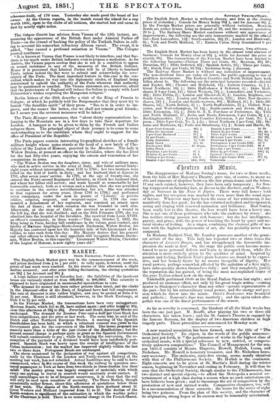ilyntus Ruh .3iittsa.
The disappearance of Madame Sontag's name, for two or three weeks,. from the bills of Her Majesty's Theatre, gave rise, of course, to many-on nits and rumours of disputes between the fair prima donna and the lessee. If any such existed, however, they have been only temporary ; . for Son- tag reappeared on Saturday last, as Rosina in the Barhiere, and on Wednes- day as Susanna in the .316=e di Figaro. There were full houses both nights, and her reception was marked by even more than the usual signs of favour. Whatever may have been the cause of her retirement, it has manifestly done her good; for she has returned refreshed and invigorated, acting and singing with renewed animation and brilliancy. Had Sontag been really lost to this theatre, the loss would have been a heavy one. She is not one of those performers who take the audience by storm : she has neither strong passion nor rich humour ; but she has intelligence,. gayety, and grace, with the power of touching the heart by quiet and na- tural strokes of feeling. As a singer, combining the choicest gifts of na- ture with the highest acquirements of art, she has probably never been surpassed.
In Madame Barbieri Nini, Mr. Lumley possesses another of the great- est artists of the day. This lady has repeated two or three times the character of Lucresiaa Borgia, and has strengthened the favourable im- pression she made at first. On the stage the public soon become accus- tomed to mere personal defects and begin to disregard them, while the attention is more entirely given to the qualities of mind: Inspired by passion and feeling, Barbieri Nini's plain features are found to be expres- sive, and her homely figure by no means incapable of dignity. Her vocal powers, perhaps somewhat affected by the agitatkm of a first night, have subsequently shown themselves fully ; and they completely justify the reputation. she has gained, of being the most accomplished singer of the pure Italian School new on the stage.
TainberlDr. performed Otello at the Royal Italian Opera list night ; and produced an immense effect, not only by his great tragie seti1g=-corniag nearer to Shaltspere's character than any other operatic representative of the part—hut by his extraordinary vocal power, and the energy and pas- sion which he threw into the music. Grisf s Desdonona was beautiful and pathetic ; Ronconrs Ingo was masterly ; and the opera taken alto- gether was one of the finest performances of the season.


























 Previous page
Previous page